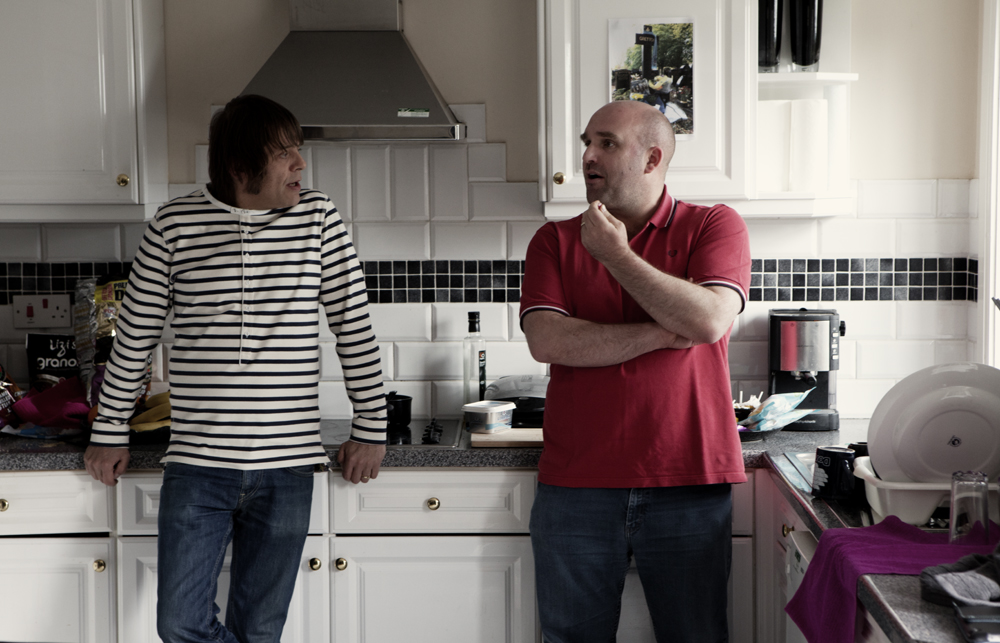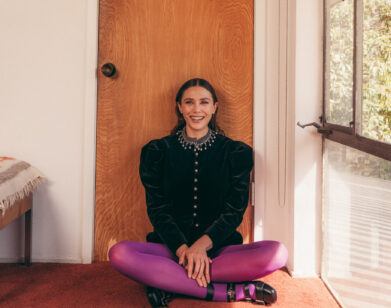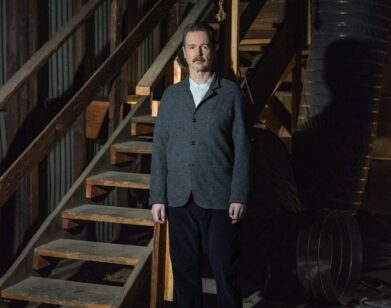A Rose by Any Other Name

ABOVE: MANI (LEFT) AND SHANE MEADOWS ON THE SET OF THE STONE ROSES: MADE OF STONE
Shane Meadows is frequently cited as one of the best filmmakers working in Britain today. His films depict an England far removed from the one told across this side of the Atlantic. They’re earnest in their grittiness and unflinchingly honest in their narrative.
His first feature for Warp Films, Dead Man’s Shoes (2004), was hailed as a landmark in British cinema and received the Hitchcock D’Or at the Dinard Film Festival, Best Film at the Southbank Show Awards, and was voted one of the best British films in the last 25 years by The Guardian. His second feature, This is England (2006), commanded the same level of praise with numerous international awards as well as Best Film at the BAFTAs.
The Stone Roses: Made of Stone is Meadow’s first documentary. The situation surrounding its production pertains to the high esteem in which he is held. When seminal band the Stone Roses announced they would be reforming after a 20-year absence, they had only one director in mind to make the movie. We caught up with Shane over Skype to talk about the band that was taken before its time and making up for missed opportunities.
DOMINIC MAXWELL-LEWIS: You’re primarily known as a political filmmaker. What is it about the Stone Roses’ story that made you decide to stray from this? There’s clearly an emotional attachment.
SHANE MEADOWS: I’d fallen in love with the band, as had a lot of my mates in the town I grew up in, because they were so unashamedly proud of their roots. They didn’t care if people loved them or hated them. They were just really bold. They had an attitude to them—almost like a punk attitude, but with this exquisite, jangly music that spoke to my generation. I’d never seen them live, either. I’d had a ticket to see them at the Spike Island concert, which I gave away one night while under the influence of acid. [laughs] I had basically missed the gig of my generation. Roll forward 20 years and I’ve gone from this little unemployed kid with no education, no qualifications, to becoming a filmmaker over the exact period since they’d split up. So my career happened completely outside of them existing as a band. Then I get this phone call in October 2011 from Ian Brown telling me that the band are getting back together and they wanted me to make the film. No true fan would ever have refused.
MAXWELL-LEWIS: Of course. But you were a boots-and-braces skinhead from age 11. What was it about the music of the Roses that corresponded with you growing up in a totally different musical scene like that?
MEADOWS: Well, I’d been bullied growing up. In a hard, working-class town, the identity of the early skinheads and that uniform really spoke to me. It was like, “Shave your head, put some Docs on, look mean, and no one will give you any kind of shit.” It wasn’t done to be an aggressive person, just to attach yourself to something to protect yourself. I mean, hanging around with these people, they looked like an army unit. They would be all sat around the bus shelter and you thought, “Jesus, they look frightening.” So when I first became a skinhead it was the whole lifestyle, the whole identity, the reggae music of the original skinhead scene. But obviously through the darker days of Thatcher’s empire, the National Front got involved, and it became racially motivated and completely changed. Something that was born out of a love of black music became a racist organization and it’s sadly remembered for that when it was never supposed to be that at all. As a young kid, there was something about it. Going into record shops and buying Toots & The Maytals and Desmond Dekker LPs… Suddenly I felt like I belonged. I was too young to truly belong, though, and it wasn’t until the Stone Roses that I found something that was genuinely me. That was my summer of love.
MAXWELL-LEWIS: How old were you when you got into them?
MEADOWS: It would have been when their singles and first album came out. Around ’88, ’89. So I was 16 or 17—that classic school-leaving age. And to see this band that’s come from what you’ve come from… And they’re brash, they’re on the front cover of the NME, and they’re full of confidence. There was an exuberance to it that made you think, although I’ve spent all my life thinking I’m going to be a dustbin man, here are these same kids a little bit older than me out there smashing the world up playing all these legendary gigs at the Empress Ballroom, Alexandra Palace, and then obviously Spike Island in 1990. It was almost like everything they did was controversial. They made one of the greatest first albums of all time and then instantly got into a legal battle with the record company and couldn’t record or rehearse. The whole story that they crammed into the short tenure from when they came to prominence was incredible from beginning to end.
MAXWELL-LEWIS: Well like you said, they disappeared almost as quickly as they arrived. How did they have this indelible effect on their fans so long after disbanding?
MEADOWS: It’s like all those great actors. You look at James Dean or River Phoenix, for example. When someone great doesn’t get to reach their prime, there’s a huge sadness attached to it. Especially if it means something to you from your youth. A lot of bands make seven, eight, nine albums and you slowly fall out of love with them. But basically they were taken at the absolute pinnacle of their success. It’s almost like Muhammed Ali with Vietnam. I mean there’s years he should’ve been boxing. For me with the Stone Roses over here it was like, “What’s happened?” Like the time I gave my Spike Island ticket away. [laughs]
MAXWELL-LEWIS: How did that feel the next day?
MEADOWS: [laughs] Oh, it wasn’t very good. Once I’d straightened myself out, I ran into town and my bus had gone. I didn’t even know who I’d given my ticket to. I knew it was a tall goth with a long black coat on, but whether he even went to the gig I don’t know. It was like a very poor impression of that bit in Easy Rider, and I was Jack Nicholson.
MAXWELL-LEWIS: So there were things to make up for.
MEADOWS: Well, I had a lot of regrets. One, you don’t think you can recapture your youth and two, the Roses split seemed very definitive. I mean John Squire created a piece of art that said “I’ve got no desire to desecrate the grave.” But the fact that they got a second chance and the fans got a second chance to fall in love with them again and play the shows they should’ve played the first time around meant they came back and recaptured the crown.
MAXWELL-LEWIS: It’s the reaction of the crowds in the film that really speaks volumes for their longevity. Especially at the Warrington Parr Hall show.
MEADOWS: It’s almost like a cathedral in there. The atmosphere, the lights, the love, the passion, the raucous energy. It was almost like people’s dreams were coming true that night. The big gig at Heaton Park is the spectacle, but emotionally I’ve never experienced anything quite like that night in Warrington. But you’re right about the crowd. It was my decision to turn the camera on the fans because I was one. And I hope the film’s better for it because you’ve got someone famous like Liam Gallagher there, but he’s only as big a fan as the builder who’s run away from a house he’s knocking through to see the show.
MAXWELL-LEWIS: That’s what I found so affecting about it.
MEADOWS: Ultimately the band could tell you about the band. The band could tell you about the highs and the lows, but there’s something about the passion of the real people who’ve followed them and want to see them again. There’s their desperation to get tickets; the unadulterated joy for those that get in and the pain of hearing it from outside for those that couldn’t. It’s a beautiful and painful and poignant moment. It’s always been a two-way relationship between the Roses and their fans. It opens with Ian [Brown] walking down the line and closes with an explosion of 15 minutes of “Fool’s Gold.” You’ve got Ian looking like a god at times, mixed in with some bloke pissing up a fence. Beautiful women and ugly men. Big women with their boobs out and some bloke asleep by a hot dog van. I mean, I’m Shane Meadows, I’m not Spielberg. I’m just showing life and I’ve got to deliver it how it is.
MAXWELL-LEWIS: But it seems like a huge departure from your normal process, using only one or two cameras.
MEADOWS: We went up to 35 cameras that night. I shot a blockbuster for two days. [laughs] And the mad thing was that it was probably easier than shooting with one or two cameras. People associate me with that kitchen-sink, real, earthy, British, social realist approach to making films; but this was all about the band and making the band look the best they could. Because there was so much rubbish footage that was shot of them in the early days that you never really got that full experience that the people who were there at the first gigs remembered.
MAXWELL-LEWIS: It seemed like you were all best friends by the end of it.
MEADOWS: It’s mad. The sad child in you, you know, the needy little kid prays that someone might text you after you’ve finished the film and still like you. I mean I’ve stood on stage and picked up awards in front of thousands of people but when you meet your heroes—whether it be in McDonald’s or in a stadium—that young part of you comes out. So I was worried when I did this. I wondered if I’d get blasé or if they’d think I was a right idiot. It was quite a big gamble. But I thought to myself at least I’ll get to sit in on a rehearsal and if they think I’m an arsehole, at least I’ve seen something. As it went on we all just got on really well. Maybe because I wasn’t leaping at opportunities to sift for filth, in the way that a lot of documentary filmmakers would have been. That probably brought us closer together. I mean, we’re still in contact, which is very nice for my 16-year-old ego and equally nice for me as a man now.
THE STONE ROSES: MADE OF STONE IS OUT IN SELECT THEATERS TODAY, NOVEMBER 6.






